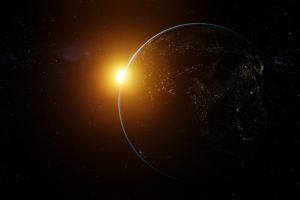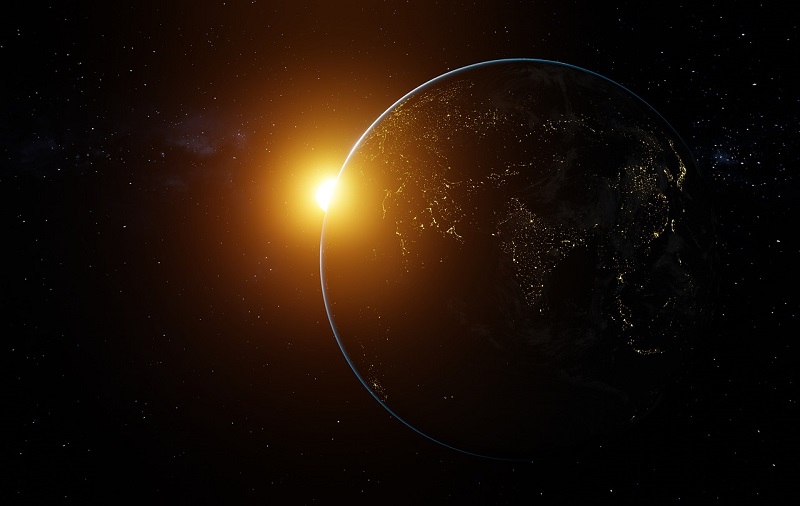The Bible’s Answer
Argument
Atheists often ask Christians questions which go along the lines of: “Can God create a rock so heavy that he cannot lift it?” or: “Can God create another all-powerful God that could destroy him?” The assumption behind these questions is usually that if God were truly all-powerful, then God could, in fact, create a rock too heavy for himself, and another all-powerful God just like himself that could destroy him. However, if that’s the case, then God would cease to be all-powerful, which would put Christianity in quite the predicament.
Response: A Misuse of Language and Definitions
The problem with this argument is that it doesn’t work, because it proposes a scenario which redefines who God is. To illustrate this point, consider this: it’s just as nonsensical as asking the question, “Can God exist and not exist at the same time?” Of course, the answer is no. It doesn’t make sense to say that God (or anything) can exist and not exist at the same time, because any thing, by definition and necessity, exists, and non-existence is nothing more than the absence of existence. To argue otherwise is to render words meaningless, which makes any further dialogue not only pointless, but impossible.
The fact that God cannot create a rock too heavy for himself to lift, or another God that could destroy him, doesn’t mean that God lacks omnipotence. It means that he actually is omnipotent, and fits the true definition of God. Let’s develop this point further.
God Cannot Contradict Who He Is
The Bible teaches that God is good, not evil (Is 61:8; Jer 9:24). C.S. Lewis, in his book “Mere Christianity”, highlights the point well that evil is not a thing that exists in and of itself, but is rather the absence of good, or the distortion of good. For example, a lie cannot exist without a truth to distort. Another example is that sex in and of itself is good, but when it is abused, for example, in rape, it is evil because it is a distortion of sex. Evil, therefore, cannot exist by itself by definition—it can only exist if there is first something good to remove or distort. This is similar to how coldness cannot exist in and of itself, but can only exist when you remove warmth, or how darkness cannot exist in and of itself, but can only exist when you remove light. In fact, the Bible plainly says:
This is the message we have heard from him and proclaim to you, that God is light, and in him is no darkness at all. (1 John 1:5)
The Bible here spells it out for us: God is light (good), not darkness (evil). Any darkness in the world, therefore, does not come from God, but is rather a departure from God’s light. Darkness contradicts who God is. Therefore, by definition and necessity, God cannot be both light and darkness: he is only light. Here is another example:
17 So when God desired to show more convincingly to the heirs of the promise the unchangeable character of his purpose, he guaranteed it with an oath, 18 so that by two unchangeable things, in which it is impossible for God to lie, we who have fled for refuge might have strong encouragement to hold fast to the hope set before us. (Hebrews 6:17–18)
Here, the Bible plainly says that it’s “impossible for God to lie”. Why? Because lying contradicts who God is. God is truth, as Jesus said—who is God in the flesh (Jn 1:1, 14)—”I am the way and the truth and the life …” (Jn 14:6). Therefore, any lie in the world does not come from God, but is rather a departure from God’s truth. We could give more examples, but this should make the point clear: God can do anything, but he cannot contradict who he is—otherwise, he would no longer be God—both by definition and necessity.
How This Applies to the Arguments
So, this brings us back to the above arguments, the first of which is: “Can God create a rock heavier than he can lift?” First, we need to ask: who is God? By definition, God is the all-powerful, all-knowing, and all-present Creator of everything in existence. Because omnipotence (being all-powerful) is part of who God is, by definition, God cannot create a rock heavier than he could lift, because that is a contradiction of who God is: always omnipotent.
‘Ah, Lord GOD! It is you who have made the heavens and the earth by your great power and by your outstretched arm! Nothing is too hard for you. (Jeremiah 32:17)
26 The word of the LORD came to Jeremiah: 27 “Behold, I am the LORD, the God of all flesh. Is anything too hard for me? (Jeremiah 32:26–27)
As for the next question: “Can God create another all-powerful God that could destroy him”? Again, part of the definition of God is that he is not only Light, Love, Truth, and Life, but he is the highest Light, the highest Love, the highest Truth, and the highest Life. In other words, God is the greatest being in existence. If there were a being who were equal with God, then God would cease being the highest being, hence in such a scenario, we no longer have God, by definition. Therefore, this scenario is also impossible, because it is a contradiction of who God is: always the highest being.
You are the LORD, you alone. You have made heaven, the heaven of heavens, with all their host, the earth and all that is on it, the seas and all that is in them; and you preserve all of them; and the host of heaven worships you. (Nehemiah 9:6)
To whom will you liken me and make me equal, and compare me, that we may be alike? (God speaking in Isaiah 46:5)
He who comes from above [i.e. Jesus] is above all. He who is of the earth belongs to the earth and speaks in an earthly way. He who comes from heaven is above all. (John 3:31)
I am the living bread that came down from heaven. If anyone eats of this bread, he will live for ever. And the bread that I will give for the life of the world is my flesh. (Jesus speaking in John 6:51)
Conclusion
So, in conclusion, the arguments mentioned at the beginning of this argument are false, because they put forth two different scenarios in which the very definition of God can be changed. The problem is, then, that if we entertain these scenarios, we are no longer talking about God, but rather a human invention—a false definition of God that we have made up. To suggest that God can use his omnipotence to undermine his own omnipotence is about as nonsensical as suggesting that God can “exist” and “not exist” at the same time. God cannot contradict who he is. Because the argument proposes a false definition of God, it is not a valid argument to use against Christianity.
The fact that God cannot contradict who he is is good news for us. Because God is good, he will never—and cannot ever—suddenly change his mind and start being evil unexpectedly, but will remain good forever. The Apostle John said, by the inspiration of the Holy Spirit of God:
So we [i.e. Christians, those who believe in Jesus] have come to know and to believe the love that God has for us. God is love, and whoever abides in love abides in God, and God abides in him. (1 John 4:16)
God is the essence of love itself, so even the most loving person on Earth (if such a person even existed) couldn’t compare to God’s love, and that will never—and can never—change. Furthermore, because God is the essence of truth itself, he doesn’t take back his promises, but is faithful to fulfil them. God has said, through the Apostle John, that even though humanity sinned against him, he sent his only Son, Jesus Christ, into the world, so that whoever believes in him will not perish, but receive everlasting life with him in Heaven.
For God so loved the world, that he gave his only Son, that whoever believes in him should not perish but have eternal life. (John 3:16)
This is a firm promise that God has made which he will never revoke, and he invites you to accept it today. Because God cannot contradict who he is, his love will remain forever with those who believe in Jesus as their only Saviour.
See Also





